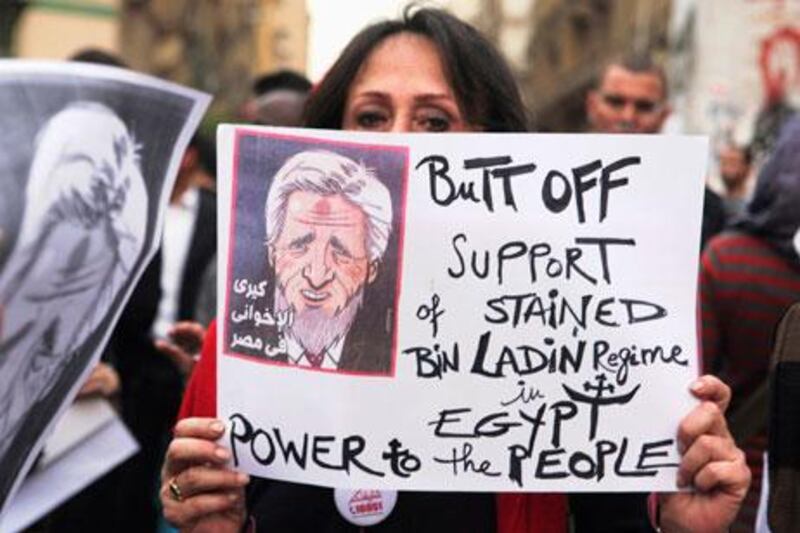CAIRO // John Kerry, the US secretary of state, arrived in Cairo yesterday amid a polarised political atmosphere in Egypt, but his calls for unity are unlikely to be a powerful impetus for change, analysts said.
In meetings with members from a range of political forces, he will push for them to come to a basic agreement on the country's direction before parliamentary elections scheduled for late April, a US official said.
Yet two leading members of the opposition, Mohamed ElBaradei and Hamdeen Sabahi, said they refused to meet Mr Kerry because of Washington's call for the National Salvation Front opposition alliance to reconsider a planned boycott of the elections. The Front has said it would participate only if President Mohammed Morsi sacked his government and created an inclusive atmosphere for politics.
"He cannot make an impact on the divisiveness in Egypt," Noha Bakr, a professor of political science at the American University in Cairo, said of Mr Kerry. "Egypt's political problems can only be solved if there is a will within to come together."
As Mr Kerry arrived from Turkey, protesters torched a police station in the Suez Canal city of Port Said. The interior ministry said about 500 protesters threw stones and petrol bombs at the police station, setting it on fire, and then blocked fire engines from approaching.
And in Mansoura, a city in the Nile Delta, at least one man was killed and dozens more injured after clashes with police on Friday night.
Mr Kerry is to hold talks with Mr Morsi, as well as political parties, business leaders and civil society groups during a two-day visit that is part of a nine-nation tour.
"He is working to touch base with the government, with the military, with people involved in the new Egypt: the political leaders, NGO leaders, the business people," a US state department official said.
Mr Kerry may have more influence on the country's economic problems. Egypt has been in discussions with the International Monetary Fund, where the US has significant sway, on a US$4.8 billion (Dh17.6bn) loan. The funds are desperately needed in Egypt as unemployment inches above 13 per cent and food prices are on the rise, but the deal has been delayed because of worries from the government about public discontent with austerity measures.
The IMF loan is contingent on Egypt creating a "home-grown" economic plan that reins in spending on subsidies and increases revenue through tax hikes.
The loan would temporarily ease pressures on the government, but more importantly unlock billions more from the US, European Union and other donors who want the IMF's seal of approval on the country's economic plan before committing funds.
"It will be important for the government to make an agreement with the IMF, not only to bring in the IMF money ... but also to unlock the other money that comes from the US, the EU, from the Arab states and from private investments," a US state department official said.
In order for there to be an agreement on the IMF loan "there has to be basic political agreement among all the various players in Egypt" as well as "basic economic consensus on reforms to support the IMF deal", the official said.
Egypt has been deeply divided since November, when Mr Morsi issued a now-repealed decree expanding his powers and protecting his decisions from judiciary oversight. He also rushed through a vote on the constitution, despite broad opposition from liberals, sectarians and Coptic Christian groups.
The two-year anniversary of the uprising sparked more street battles, especially in the cities along the Suez Canal.
* With additional reports from Agence-France Presse and Associated Press





